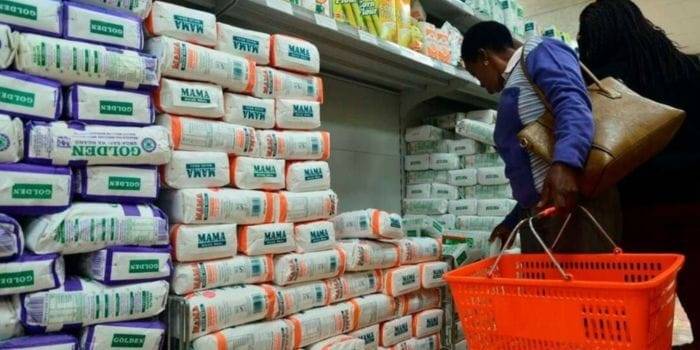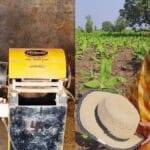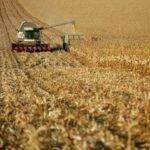Main Points In Hindi (मुख्य बातें – हिंदी में)
यहाँ पर दिए गए текст के मुख्य बिंदु हैं:
-
जीएमओ मक्का के लिए आवेदन: केनिया में, सरकार ने मक्का के उत्पादन और बिक्री के लिए एक आवेदन को मंजूरी देने पर विचार किया है, जिसका अर्थ यह हो सकता है कि बाजार में जल्द ही जीएमओ मक्का का उछाल देखने को मिलेगा। यह घटना एक दशक पुराने प्रतिबंध को हटाने के दो साल बाद हो रही है।
-
संवेदनशीलता से बातचीत: राष्ट्रीय जैव सुरक्षा प्राधिकरण (एनबीए) ने केनियाई लोगों से जीएमओ मक्का पर अपनी राय और टिप्पणियाँ देने के लिए कहा है, जिससे यह पता चलेगा कि क्या इसे खेती में लाया जाना चाहिए या नहीं।
-
बीटी मक्का के लाभ: आवेदन करने वाले संस्थानों के अनुसार, बीटी मक्का की विशेषता यह है कि यह कुछ कीटों से खुद को बचाने की क्षमता रखता है, जिससे किसान अपनी फसल के नुकसान को कम कर सकते हैं और उत्पादन की गुणवत्ता में सुधार ला सकते हैं।
-
उत्पादन में वृद्धि: 2023 में मक्का उत्पादन में 38.8 प्रतिशत की वृद्धि हुई है। सरकार की उम्मीद है कि साल के अंत तक इसका उत्पादन 60 मिलियन बैग से अधिक हो जाएगा, जो खाद्य सुरक्षा को मजबूत करने की दिशा में एक महत्वपूर्ण कदम हो सकता है।
- सार्वजनिक भागीदारी: एनबीए ने जनता को आवेदन के संबंध में अपने विचार साझा करने के लिए आमंत्रित किया है, ताकि इस विषय पर सामुदायिक विमर्श हो सके और उचित निर्णय लिया जा सके।
Main Points In English(मुख्य बातें – अंग्रेज़ी में)
Here are the main points from the provided text:


-
Approval for GMO Maize: The Kenyan government, under President William Ruto, is considering an application for the production and sale of genetically modified organism (GMO) maize, nearly two years after lifting a decade-long ban on GMO products.
-
Public Consultation: The National Biosafety Authority (NBA) has issued a notice requesting public comments on whether GMO maize should be cultivated in Kenya. The two institutions involved, KALRO and AATF, are seeking permission to launch the environmental release of GMO maize, specifically BT maize.
-
Benefits of BT Maize: If approved, farmers will be able to grow and sell BT maize, which is designed to resist pests like the maize stem borer and fall armyworm. The NBA suggests this could lead to reduced crop damage, increased yields, improved grain quality, and lower production costs by minimizing pesticide use.
-
Rising Maize Production: The Kenyan government has reported a significant increase in maize production, with projections for over 60 million bags in 2023 compared to 47.6 million bags in 2022.
- Public Feedback Timeline: The NBA has invited members of the public to submit their written comments regarding the GMO maize application within 30 days of the announcement.
Complete News In Hindi(पूरी खबर – हिंदी में)
यदि सरकार मक्का के उत्पादन और बिक्री के लिए एक आवेदन को मंजूरी दे देती है तो बाजार में जल्द ही जीएमओ मक्का में उछाल देखा जाएगा। यह आवेदन राष्ट्रपति विलियम रूटो की सरकार द्वारा जीएमओ उत्पादों पर एक दशक से चला आ रहा प्रतिबंध हटाने के लगभग दो साल बाद आया है।
के माध्यम से एक नोटिस में दैनिक राष्ट्र शुक्रवार को जारी राष्ट्रीय जैव सुरक्षा प्राधिकरण (एनबीए), एक राज्य एजेंसी जिसे जीएमओ फसलों को विनियमित करने का काम सौंपा गया है, ने केन्याई लोगों से इस पर टिप्पणी करने के लिए कहा कि देश में जीएमओ मक्का उगाया जाना चाहिए या नहीं।
नोटिस के अनुसार, केन्या कृषि और पशुधन अनुसंधान संगठन (KALRO) और अफ्रीकी कृषि प्रौद्योगिकी फाउंडेशन (AATF) पर्यावरणीय रिलीज या खुले क्षेत्र में खेती और आनुवंशिक रूप से संशोधित मक्का (Zea mays), जिसे आमतौर पर जाना जाता है, को बाजार में उतारने के लिए मंजूरी मांग रहे हैं। बीटी मक्का के रूप में.
यदि प्राधिकरण आवेदन की अनुमति देता है, तो किसान मक्का खरीदने और उगाने के लिए स्वतंत्र होंगे। साथ ही, किसान, दलाल और व्यापारी जैविक रूप से उगाए गए मक्के के साथ प्रतिस्पर्धा करते हुए मक्के को बाजार में बेचने के लिए स्वतंत्र होंगे।
ठेले पर मक्के की कटाई।
तस्वीर
सोको निर्देशिका
नोटिस के एक हिस्से में लिखा है, “एनबीए जनता को सूचित करता है कि उसे पर्यावरणीय रिलीज या खुले मैदान में खेती और आनुवंशिक रूप से संशोधित मक्का (ज़िया मेस) जिसे आमतौर पर बीटी मक्का के रूप में जाना जाता है, को बाजार में लाने के लिए एक आवेदन प्राप्त हुआ है।”
प्राधिकरण का कहना है कि दोनों संस्थानों ने अनुमोदन के लिए अपने पत्र में संकेत दिया है कि बीटी मक्का में विशिष्ट कीटों जैसे मक्का के तना छेदक और फॉल आर्मीवर्म से खुद को बचाने की क्षमता होगी, जो मक्का के खेतों में विनाशकारी कीट हैं।
“आवेदन दस्तावेजों के अनुसार, किसान अपनी मक्का की फसल को कम नुकसान की उम्मीद कर सकते हैं, जिससे पैदावार में वृद्धि और अनाज की गुणवत्ता बेहतर हो सकती है। इससे उत्पादन लागत भी कम हो सकती है और कीट प्रबंधन के लिए उपयोग किए जाने वाले कम कीटनाशकों का उपयोग करके स्वास्थ्य और पर्यावरण के लिए जोखिम कम किया जा सकता है, ”एनबीए का कहना है।
प्राधिकरण केन्यावासियों से अपनी वेबसाइट पर उपलब्ध आवेदन प्रपत्रों के माध्यम से अपने विचार साझा करने के लिए कह रहा है।
प्राधिकरण ने कहा, “जनता के सदस्यों को इस घोषणा के 30 दिनों के भीतर लिखित रूप में अपनी टिप्पणियाँ देने के लिए आमंत्रित किया जाता है।”
यह पहली बार नहीं होगा जब बीटी मक्का बाजार में बेचा जा रहा है। 2022 में, सरकार ने जीएमओ फसलों पर एक दशक पुराना प्रतिबंध हटा दिया। उस समय, सरकार ने कहा कि इस कदम का उद्देश्य खाद्य सुरक्षा चुनौतियों का समाधान करना था।
यह आवेदन तब आया है जब सरकार पिछले दो वर्षों में देश में बढ़ते मक्का उत्पादन को लेकर उत्साहित है।
सरकार के अनुसार, मक्के का उत्पादन मात्रा 2023 में 38.8 प्रतिशत बढ़कर 47.6 मिलियन बैग हो गया, जो 2022 में 34.3 मिलियन बैग था। इस वर्ष, कृषि कैबिनेट सचिव एंड्रयू करंजा कहते हैं मक्के का उत्पादन बढ़कर 60 मिलियन बैग से अधिक होने का अनुमान है।
मक्का अधिकांश घरों में मुख्य भोजन बना हुआ है, चार लोगों के परिवार के लिए इसकी औसत वार्षिक खपत लगभग 278 किलोग्राम है।
एल्डोरेट राष्ट्रीय अनाज और उत्पादन बोर्ड (एनसीपीबी) डिपो में मक्का साइलो और ड्रायर।
फोटो: NCPB
Complete News In English(पूरी खबर – अंग्रेज़ी में)
If the government approves an application for the production and sale of GMO maize, there will soon be a surge in the market for GMO maize. This application comes nearly two years after President William Ruto’s government lifted a decade-long ban on GMO products.
In a notice released on Friday by the National Biosafety Authority (NBA), a state agency responsible for regulating GMO crops, Kenyans were invited to comment on whether GMO maize should be grown in the country.
According to the notice, the Kenya Agricultural and Livestock Research Organization (KALRO) and the African Agricultural Technology Foundation (AATF) are seeking approval to release genetically modified maize (Zea mays), commonly known as BT maize, for environmental release or open field farming.
If the authority approves the application, farmers will be free to buy and grow maize. Additionally, farmers, brokers, and traders will be able to sell maize in the market while competing with organically grown maize.
Harvesting maize on a cart.
Photo
Source: Soko Directory
A part of the notice states, “The NBA informs the public that it has received an application to bring genetically modified maize (Zea mays), commonly known as BT maize, to market for environmental release or open field cultivation.”
The authority notes that both institutions have indicated in their approval letter that BT maize will have the ability to protect itself from specific pests, such as the maize stem borer and fall armyworm, which are destructive pests in maize fields.
“According to the application documents, farmers can expect reduced damage to their maize crops, leading to increased yields and improved grain quality. This may also lower production costs and reduce the use of pesticides, thereby minimizing health and environmental risks,” the NBA stated.
The authority is inviting Kenyans to share their views through application forms available on its website.
The authority said, “Members of the public are invited to submit their written comments within 30 days of this announcement.”
This will not be the first time BT maize is sold in the market. In 2022, the government lifted a decade-long ban on GMO crops, stating that the move aimed to address food security challenges.
This application comes at a time when the government is excited about increasing maize production in the country over the past two years.
According to the government, maize production increased by 38.8% in 2023, reaching 47.6 million bags, up from 34.3 million bags in 2022. This year, Agriculture Cabinet Secretary Andrew Karanja predicts that maize production could exceed 60 million bags.
Maize remains a staple food in most households, with an average annual consumption of about 278 kilograms for a family of four.
Maize silos and dryers at the Eldoret National Cereals and Produce Board (NCPB) depot.
Photo: NCPB










